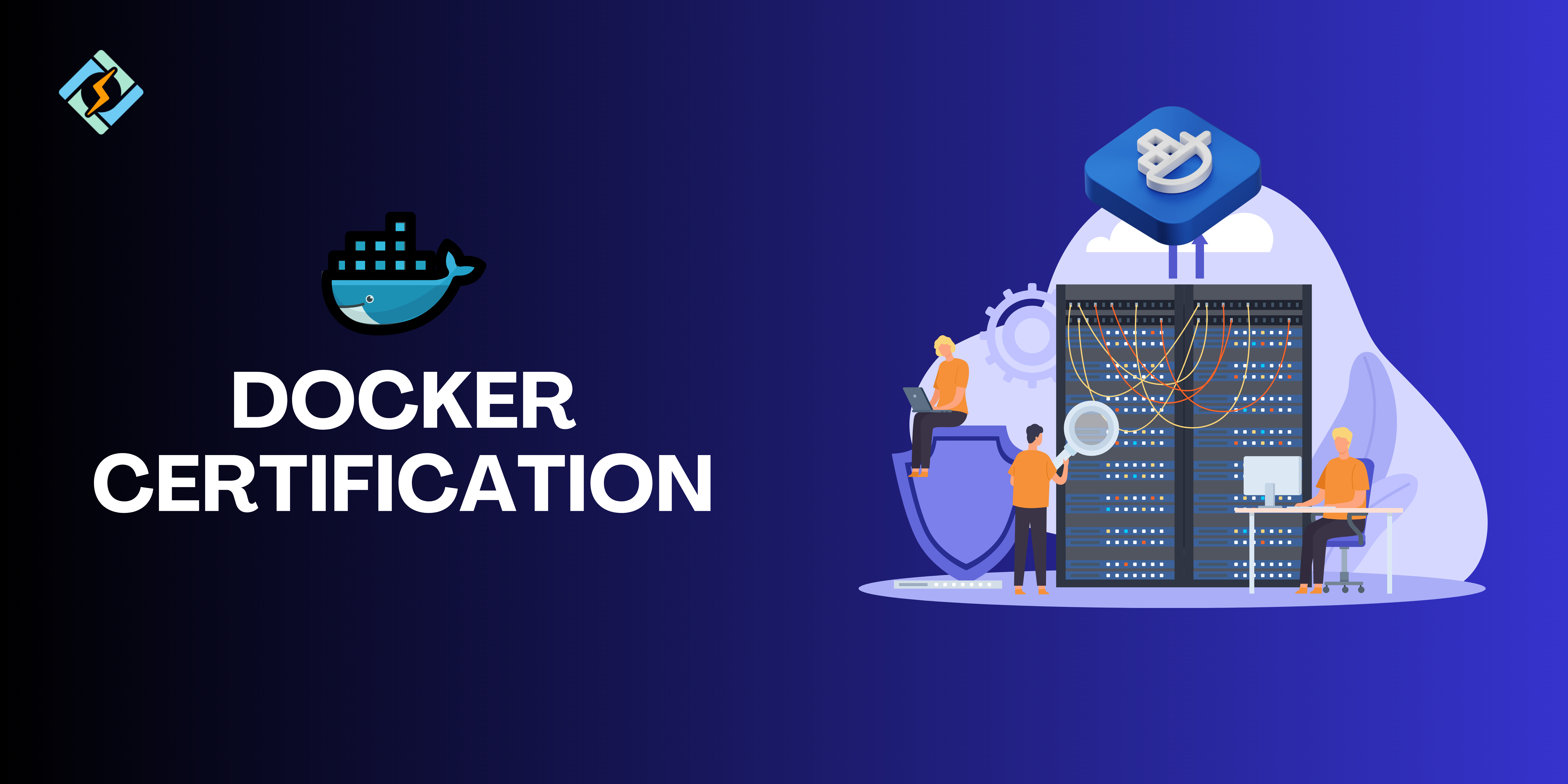People get a Docker certification for many reasons! And that’s what we’re going to explore today. Developing one’s skills in the ever-changing tech industry is crucial for job advancement in 2024. Docker is currently one of the most popular tools in the current software development market, being used by many teams to divide their large, monolithic apps into smaller, easier-to-manage components.
Docker is necessary and stands out among other tools. So inevitably, There is the need for highly qualified professionals in this industry is still growing as more and more firms choose containerization due to its efficiency and scalability. But how can one set themselves out in such a cutthroat environment? Docker certification holds the solution.
Having a Docker certification requires more than just passing a test; it’s your effort and dedication to improving your abilities and staying competitive in the tech industry. This article will discuss the value of Docker certification, the Types and, 5 available resources, and how to get ready to take this significant professional step.
What is Docker Certification & How Can it Boost My IT Career?
A Docker certification Docker Certified Associate (DCA) exam is an official certification from Docker, Inc. that attests to your expertise with Docker technology. In the tech world, it’s equivalent to a badge of honor, demonstrating your dedication to becoming an expert in containerization. However, this credential serves as a springboard for professional advancement and is much more than a wall hanging.
Why Get a Docker Certification?

There are many reasons to pursue a Docker Certification for professional growth, such as the following are a few benefits of a Docker Certification:
- Industry relevance: Since a fundamental tool for containerization, Docker is now essential for experts in software development, cloud computing, and DevOps.
- Progression in your professional life: Having a Docker certification makes you stand out to companies, which can lead to promotions and more specialized positions like cloud architecting or DevOps engineering.
- Demonstrated proficiency: A Docker certification confirms your abilities, showcasing comprehension of fundamentals and advanced concepts such as image creation and container management scalability.
- More career opportunities: Professional certification will help you stand out in a crowded work market as many businesses increasingly seek qualified individuals.
- Getting certified as a Docker helps you become more confident because it shows you have the necessary skills and knowledge to apply or manage real-world containerization issues.
- Use a single DTR replica, a single worker node, and a single UCP manager to stand up on enterprise clusters.
- As a certified Docker professional, you can also use the Docker Certified Associate (DCA) logo on your CV and other documents for personal use.
Careers as a Docker Certified Associate (DCA) in 2024
With Docker Certification, especially in 2024, you can unlock so many opportunities for roles in cloud platforms, automation, container management, and deploying scalable applications using Docker and other technologies.
Get exclusive access to all things tech-savvy, and be the first to receive
the latest updates directly in your inbox.
- DevOps Engineer: Serves as a liaison between IT operations and software development.
- Cloud Engineer: Creates standard environments across multiple cloud platforms by leveraging Docker’s containerization.
- Technical Support Engineer: Offers professional advice and troubleshoots containerization problems.
- Container Tech Engineer: Constructs, enhances, and manages applications that are containerized.
- Security Engineer: Uses best practices in security to guarantee the integrity and safety of containerized applications.
- Developer: Creates apps that are efficiently containerized, resulting in more consistent deployment and fewer compatibility problems.
Additional Roles hiring Docker-certified professionals: Site Reliability Engineer (SRE), Cloud Engineer, Software Engineer, System Administrator, Infrastructure Engineer, Platform Engineer, Containerization Specialist, CI/CD Engineer, IT Operations Engineer.
Expected Annual Salary Trends For Docker Certification ( DCA) Professionals in 2024
The average yearly salary for a variety of employment roles that you might be eligible for with the DCA certification is listed below. Here’s what salary trends are expected for someone with a DCA skill in 2024:
| Job Roles | Estimated Annual Salary (2024) |
| DevOps Engineer | $110,000 – $160,000 |
| Cloud Engineer | $105,000 – $150,000 |
| Site Reliability Engineer | $120,000 – $170,000 |
| Software Engineer | $100,000 – $145,000 |
| Containerization Specialist | $115,000 – $160,000 |
Types of Docker Certifications Available in 2024
Now let’s look at some of the most important and popular Docker Certification types, discussed to help you understand and choose the right one.
Docker Certified Associate Certification
Go for the Docker Certified Associate (DCA) an entry-level certification to authenticate your basic Docker skills, provided by Docker, Inc.
It’s great for beginners new to this field but have a basic understanding of Docker and its environment, it’s a requirement for obtaining more advanced qualifications. It confirms that you have the basic concepts of networking, security, and container orchestration ( understanding what containers are and how they differ from traditional virtualization) as well as Docker. And additional knowledge of essential components, such as Docker Compose, Docker Hub, and Docker Engine.
Docker Certified Professional (DCP)
This one is an advanced-level Docker certification and was created for individuals who are already proficient with Docker and wish to enhance their knowledge.
It’s most suitable for professionals working in large-scale Docker settings. From Kubernetes-based container orchestration to more complex subjects like networking, application deployment, and troubleshooting, this certification covers everything. If you have prior experience overseeing intricate Docker deployments, the DCP can truly verify your proficiency.
DCSS, or Docker Certified Security Specialist
Get DCSS, Docker certification is perfect if you work in an environment where security is a top priority. Being able to manage vulnerabilities and maintain the safety of the software supply chain are just two of the many reasons why container security is so important, especially as more companies use Docker.
The reason it’s ideal is it shows that you’re up to date on the latest container security best practices and that you understand how to protect Docker environments.
DCSP, or Docker Certified Service Provider
The Docker Service provider is a little different than the rest! It’s intended for businesses offering consulting or professional services rather than individuals (A rather strategic move). The reason this accreditation stands out is that you demonstrated to prospective clients that your company is well-versed in Docker. This will make it easier for service providers or consulting organizations to demonstrate that they are knowledgeable about providing Docker solutions.

Additionally, focuses on offering top-notch services, utilizing best practices for Docker, and assisting customers in smoothly integrating Docker technology. Getting this Docker certificate can help your organization stand out if your goal is to become a reliable supplier in the Docker ecosystem.
Preparing for Docker Certification: Effective Study Strategies!
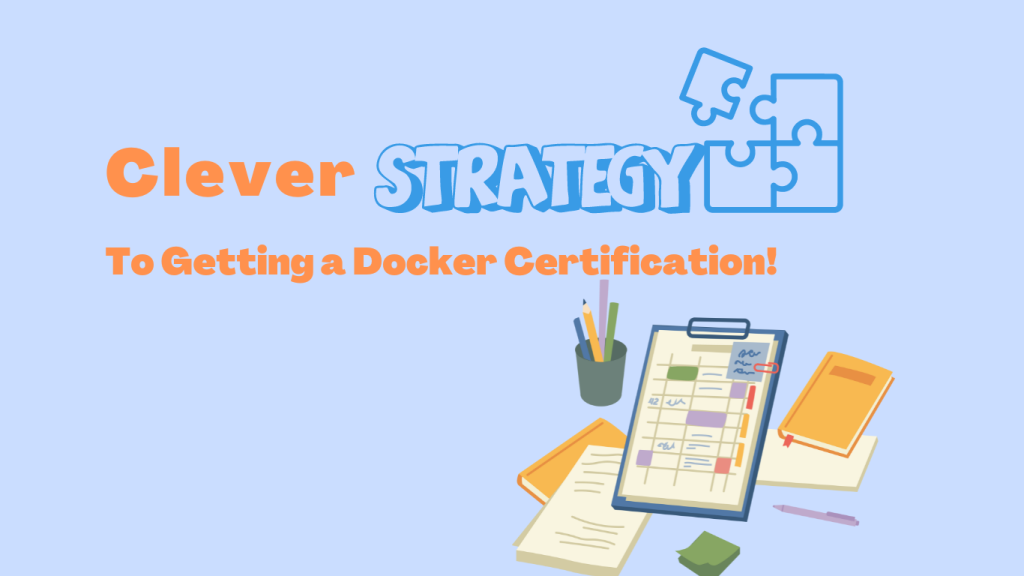
Preparing for a Docker Certification exam might initially feel overwhelming, but there’s always a way to manage it if you start with the right approach! Here’s how you can ace your Docker Certified Associate Exam!
First Get Familiar with The Exam Structure!
The DCA exam consists of 55 multiple-choice and discrete-option questions that are administered in a 90-minute format. Before taking the exam, which costs $195, it is recommended to have six to twelve months of Docker experience. This is the (Exam code-DCA-100), The exam is remotely proctored on your Windows or Mac computer instead of requiring you to physically visit the facility.
Following exam passing, the certification is valid for two years. It proves you have fundamental real-world Docker abilities.
So The exam covers 6 main “domains”:
- Networking (15% of exam)
- Orchestration (25% of exam)
- Security (15% of exam)
- Storage and Volumes (10% of exam)
- Installation and Configuration (15% of exam)
- Image Creation, Management, and Registry (20% of exam)
The certification is awarded by Docker (certified by Examity) – serves to demonstrate your familiarity and proficiency with Docker-based application deployment. You must be familiar with Docker Swarm, service creation, and container orchestration and a 70% score to pass the test a good part is immediate results.
Here’s what we meant by being proficient in container tools & orchestration:
- Templates for services
- Replication of services
- Locking a clump of swarms
- Global and replicated services
- Installing programs in stack files
- Setting up clusters in swarm mode
- Diagnose and fix a non-deploying service
- Interaction between legacy systems and Docker applications
- Operating a service in contrast to. Managing a stack of active services while operating a container
Words of Someone who took the DCA exam and PASSED!
” The Docker exam was not an easy exam and you definitely want to have some hands-on with Docker before taking it. There are a ton of resources out there that you can leverage beyond hands-on to assist in your study for this certification. There are many books available. You can do a quick search on Amazon and check the reviews for one that would be a good fit for you. I have read a couple of books on Docker and have co-authored a book on AKS with a chapter dedicated to Docker.” (sbuchanan)
How To Preparing For Your DCA Exam
If you prepare for your Docker certification exam keeping in mind the following steps, we guarantee you’ll succeed! You just need to adopt a smart approach!
1. Become familiar with Docekr Basics: A great way to start is to read the official Docker documentation thoroughly & very carefully, making notes, and bookmarking relevant areas. Start with online lessons or courses for beginners to understand the following important concepts: I
- Making use of Docker images
- Docker networking and storage
- Setting up and using containers
We have the Docker Study Guide for you, download this for all details.
2. Review the Certification Blueprint: Practice with mock exams and example questions, Utilize online tools to create practice tests and question banks, as well as the exam blueprint’s example question set. Make sure to thoroughly read it as it covers the subjects you will be tested on. You will then have a clear plan of what to learn and where to concentrate your efforts.
3. Practical Docker Experience: To play around with networking, debugging, container creation, and Docker commands, set up a Docker environment locally using a cloud-based service or your PC, and set up a lab environment where you can practice and sharpen your skills. Also, Docker labs are free!
4. Enroll in online training programs: Make use of resources such as Pluralsight, Udemy, and Linux Academy. These platforms offer in-depth courses designed with Docker certification in mind. They will help you prepare for your Docker certification Exam by providing practice for real-world situations through interactive courses, practical laboratories, and mock tests. These programs are flexible, allowing you to learn at your own pace and easily incorporate studying into your everyday routine.
5. Participate in Study Groups and Discussion Forums: You can learn a lot more by participating in online forums and study groups as you exchange knowledge and obtain insightful information with other certification candidates. With others who are also getting ready for Docker certification, you’ll be able to share ideas, work through problems, and pick up tips. Taking part in discussions on Reddit, Docker community boards, or LinkedIn groups will help you expand your knowledge and may even introduce you to new strategies to study!
Final Tips!
- For beginners, start early.
- Create a weekly study timetable.
- Concentrate on resolving problems on containers.
This will pretty much give you a clear vision when preparing for your exam, Lastly, We would suggest doing consistent revisions of difficult topics, and experimenting with hands-on experience is often the best teacher with Docker!
A 4-Week Study Plan for Docker Certification
To help you prepare more efficiently, we made you a 4-week study timetable, you can follow this or take it as an inspiration when preparing for a Docker Certification exam. Take a look:
| Week | Topic | Study Hours | Activities/Resources |
| Week 1 | Introduction to Docker and Core Concepts | 10 | Watch introductory videos on Udemy/Pluralsight Read Docker documentation on basic commands and concepts |
| Week 2 | Docker Containers, Images, and Registries | 12 | Hands-on practice: Create, run, and manage containers Explore DockerHub and image creation Practice exercises on Linux Academy |
| Week 3 | Docker Networking and Orchestration with Kubernetes | 10 | Learn Docker networking (bridge, overlay networks) Study Kubernetes basics Lab exercises: Set up a multi-container environment |
| Week 4 | Advanced Docker: Security, Troubleshooting & Exam Review | 12 | Focus on Docker security, monitoring, and logging Join study groups/forums to discuss exam tips Practice exam questions/mock tests |
This schedule involves spending roughly 10–12 hours a week, assuming a 4-week preparation period.
5 Accredited Docker Certification Courses Online
Out of the many Docker certification online courses, we’ll talk about the 5 most useful ones.
1. Docker Certified Associate 2023
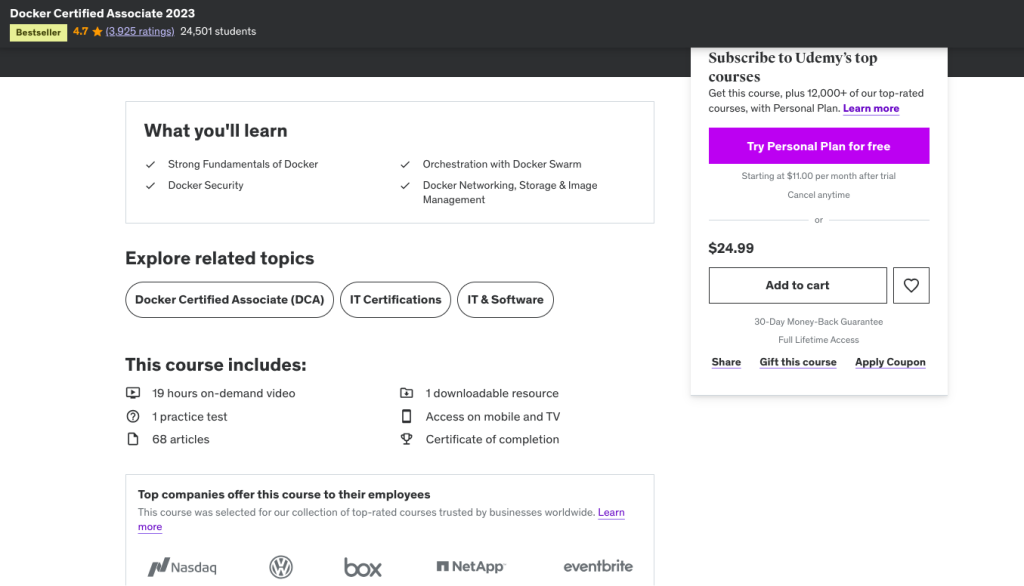
The networking, orchestration, and software security are highlighted in this course. It provides you with 22 videos, totaling 14 hours in length, 29 articles, and Eight labs.
2. Docker – SWARM – Hands-on – DevOps
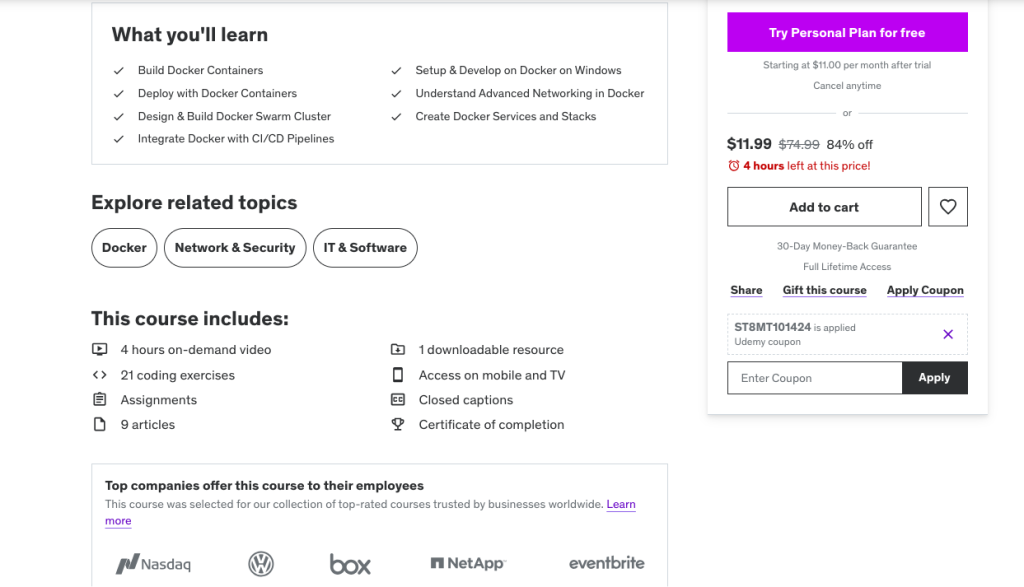
This course offers an advanced course in an easy-to-understand, entry-level manner, teaching you commands and coding. By receiving instruction in a range of Docker tools, you can also learn how to develop and oversee your own applications.
3. The DCA Path, developed by Pluralsight
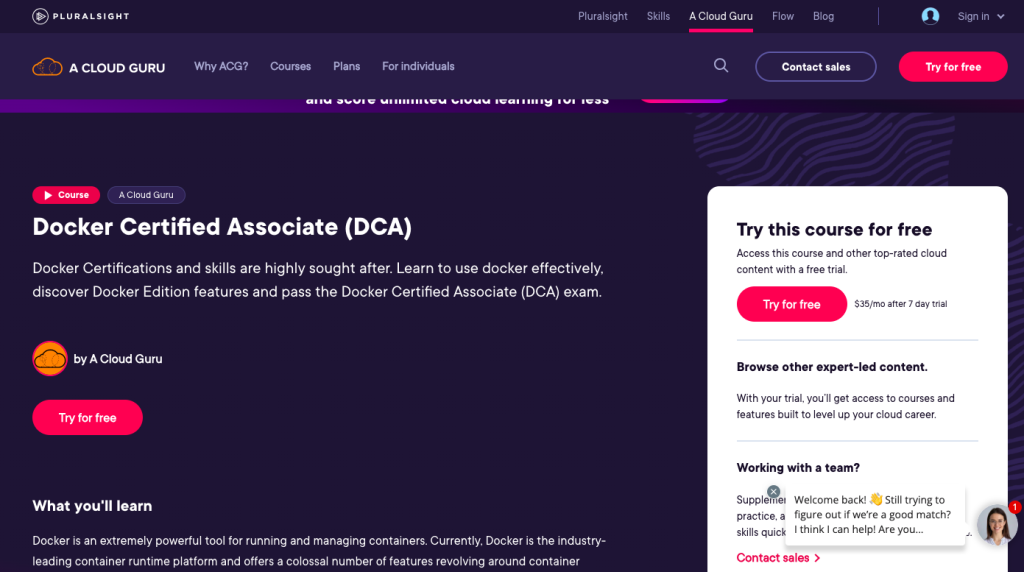
Pluralsight provides a well-tailored path with interactive labs, exams, and comprehensive tutorials on Docker architecture, networking, and orchestration that are specially intended for DCA certification candidates.
4. The Docker Certified Associate (DCA) Exam Prep from A Cloud Guru
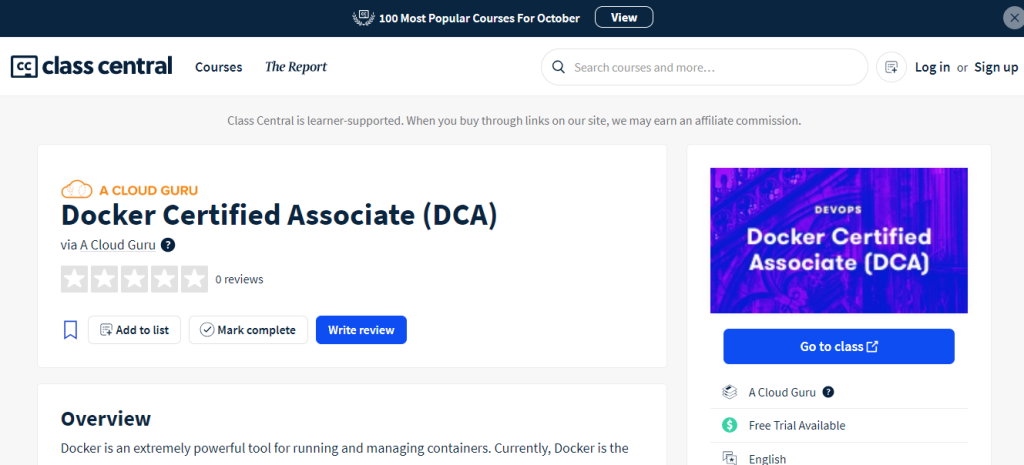
This is another great Docker Certification online course, With its targeted preparation methods, practice questions, and real-world examples, this course is totaling 19 hours, with a free trial available to help you ace the DCA certification.
5. Docker training bootcamp – Tutorial course for DevOps-Udemy
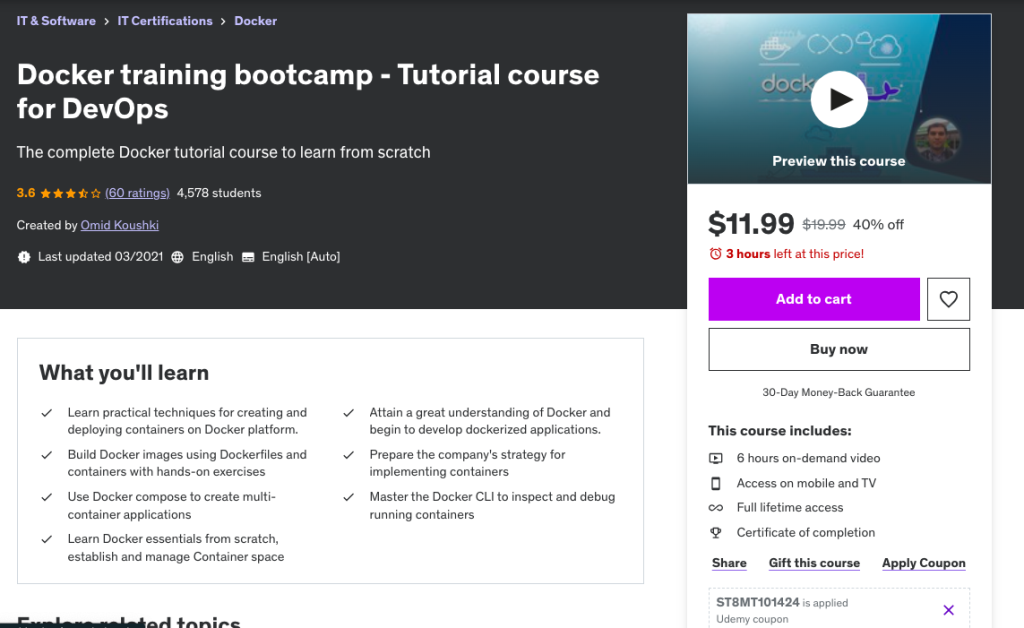
This Docker certification course is a comprehensive, practical learning experience provided by the Docker training boot camp. You will begin by learning the fundamentals of Docker and containerization before delving into the inner workings of containers. Learning to create custom Docker images, “Dockerize” your applications, and becoming skilled with Docker CLI commands are all part of the process.
Advanced subjects like Docker Swarm, cloud-native apps, and container management in a work context are also covered in the course, equipping you with the knowledge and abilities required to successfully manage containerized environments in your team.
Conclusion
Getting a Docker Certification undoubtedly is a smart step for your career as a developer, IT professional, DevOps worker, and cloud engineer and take it to the next level! To stay relevant in this fast-paced digital world you have to be unique which makes you a valuable asset for any organization.
Believed to be a difficult exam, so if you’re planning to take on this challenge, you must put in that extra effort by incorporating the right resources we mentioned with a strict and well-planned study schedule you can easily do it!
To put it briefly, the motivation behind getting certified is to maintain one’s competitive edge, increase self-assurance, and lead a field that is quickly adopting Docker and containerization as common usage. It’s about future-proofing your job, which goes beyond simply earning a certification.
FAQ’s
1. Why is Docker Certification needed, and what does it mean?
Having a Docker certification makes you stand out in the competitive tech job market by showing your skills with Docker technologies and containerization. It demonstrates to potential employers that you are an expert at creating, deploying, and maintaining containerized applications using Docker.
2. What Types of Docker Certification I can do?
Docker provides certificates that target various skill levels and specialties, such as the Docker Certified Associate (DCA), Docker Certified Professional (DCP), Docker Certified Security Specialist (DCSS), and Docker Certified Service Provider (DCSP).
3. The DCA is hard to prepare, how can I prepare?
You can enroll in online courses, complete hands-on labs, follow structured study programs, and participate in study groups to be ready for the Docker Certification. Some well-liked resources are Pluralsight, Linux Academy, and Udemy.
4. With a Docker certification, what career options exist?
As more companies look for experts with Docker certification, you can explore careers like DevOps Engineer, Cloud Architect, Systems Administrator, Solutions Architect, and Docker Consultant with Docker Certification.
5. How much time is needed to get ready for the Docker Certification?
Depending on your existing containerization expertise, preparing for the Docker Certification usually requires two to three months of intense study time that includes theory, practical application, and mock exams.
